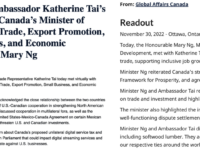Later today, the Canadian Heritage committee will continue its clause-by-clause review of Bill C-18, the Online News Act. The committee is virtually certain to expand the eligibility of news outlets, responding to concerns that the current criteria may exclude smaller, independent outlets from benefiting from the bill’s mandatory payment/arbitration system. However, earlier this week, just as the committee was hearing that the bill covers quotes with links to news content by users in Facebook posts, it quietly expanded the scope of the definition of “eligible news business” in a manner that opened the eligibility door to some organizations that may not even produce news content. As a result, the bill faces another potential trade challenge as it evolves into a straight subsidy model in which the bulk of the payments go from Internet companies to Canadian broadcasters with little regard for value or any notion of actually use of news content.
Blog
A Tale of Two Readouts: U.S. Escalates Trade Concerns With Canadian Digital Policy as Canada Seeks To Downplay the Issue
Canadian International Trade Minister Mary Ng and U.S. Trade Representative Katherine Tai met yesterday to discuss Canada-U.S. Trade issues and concerns regarding Canada’s digital policy – most notably a proposed digital sales tax and Bills C-11 and C-18 – continue to mount. The U.S. raised digital policy concern over the summer, specifically citing Bill C-11 with a reference to “pending legislation in the Canadian Parliament that could impact digital streaming services.” The latest readout suggests that the concerns are growing, as the U.S. now cites both Bills C-11 and C-18 by raising “pending legislation in the Canadian Parliament that could impact digital streaming services and online news sharing and discriminate against U.S. businesses.”
Freedom of Expression for a Price: Government Confirms Bill C-18 Requires Platform Payment for User Posts That Include News Quotes and Hyperlinks
The longstanding debate over whether Bill C-18, the Online News Act, requires payment for linking came to an end yesterday. Government officials admitted that even basic quotes from news articles that include a hyperlink to the original source would scope user posts into the law and require platforms such as Google and Facebook to negotiate payment for the links. As noted below, even that position may understate the impact of the bill, which appears to also cover a user post of a news quote without a link. In other words, merely quoting a few sentences from a news article on an Internet platform is treated as making news content available, which triggers a requirement for the platforms to negotiate payment. This position runs counter to Canada’s copyright obligations under the Berne Convention and has no place in a country committed to freedom of expression.
Who Is the Government Really Backing With Bill C-18?: Rejected Online News Outlet Amendment Tells the Story
Last week, I wrote about Liberal MP Lisa Hepfner’s comments at the Heritage committee study into Bill C-18, as she dismissed a proposed Conservative amendment by offering a misleading take on CRTC regulation of the news and stating that online news outlets are “not news.They’re not gathering news. They’re publishing opinion only.” Those comments unsurprisingly sparked anger from many online news outlets, leading to an apology from Hepfner in which she said that Bill C-18 will support digital journalists in their work. Yet a day later, the committee was back at clause-by-clause review and while Hepfner remained silent, her colleagues voted down an amendment proposed by online news services which re-affirms that action speaks louder than words.
Dismissing Digital News Outlets: Liberal MP Claims Online News Services Don’t Report News
Since its introduction last spring, online news outlets have expressed fears that Bill C-18, the Online News Act, will primarily benefit large incumbent news organizations. Those concerns grew once the Parliamentary Budget Officer estimated that more than 75% of the revenues would go to broadcasters such as Bell, Rogers, and the CBC. After Postmedia and Torstar collect their share, there may be little left for innovative online startups. The government has seemingly tried to ignore those startups with Canadian Heritage Minister Pablo Rodriguez talking about 400+ news outlet closures since 2008, but neglecting to refer to the hundreds of new outlets that have sprung up during the same period.
During the clause-by-clause review of Bill C-18, Liberal MP Lisa Hepfner, herself a former journalist, provide a stunning illustration of how the government only views incumbent news outlets as worthy of support. Responding to a proposed Conservative amendment to the bill, Hepfner stated:











